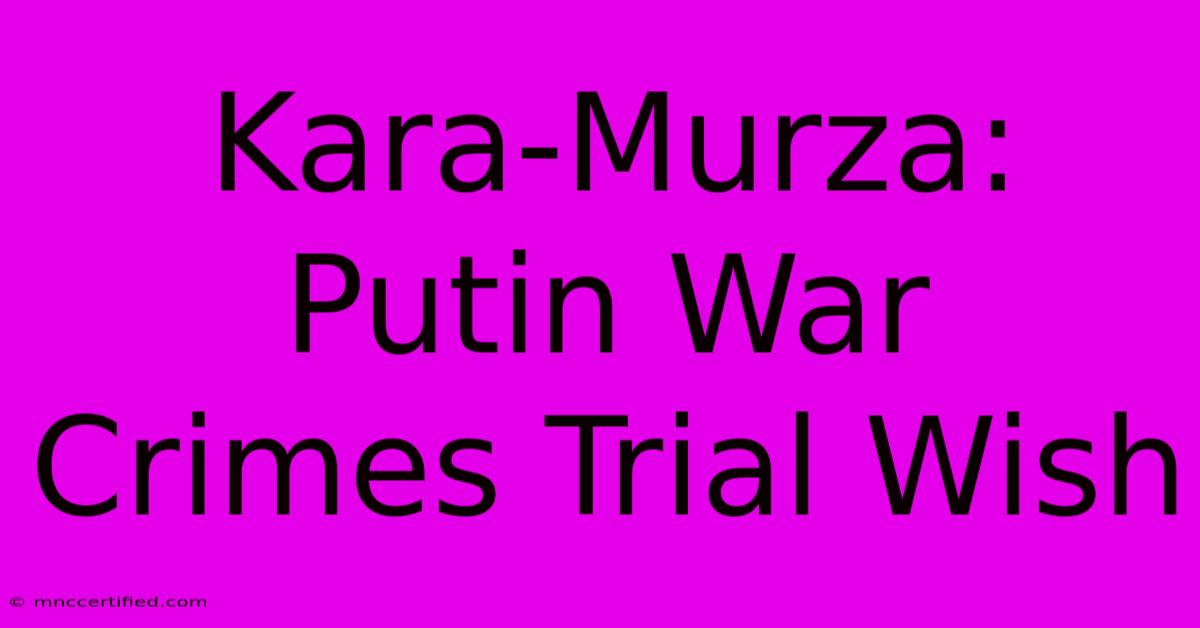Kara-Murza: Putin War Crimes Trial Wish

Table of Contents
Kara-Murza: A Putin War Crimes Trial Wish and the Urgent Need for Accountability
Vladimir Kara-Murza, a prominent Russian opposition figure and outspoken critic of Vladimir Putin, has consistently called for a war crimes trial against the Russian president and his inner circle. This desire stems from the devastating consequences of Russia's invasion of Ukraine, which has resulted in widespread atrocities and flagrant violations of international law. Kara-Murza's advocacy highlights the crucial importance of holding perpetrators accountable for their actions in the conflict.
The Gravity of the Situation: Evidence of War Crimes
The invasion of Ukraine has witnessed a horrifying array of alleged war crimes, including:
- Targeting of civilians: Numerous reports detail the indiscriminate shelling of residential areas, hospitals, and schools, resulting in countless civilian casualties. This constitutes a clear violation of international humanitarian law.
- Use of prohibited weapons: Allegations of the use of cluster munitions and other internationally banned weapons have surfaced, adding another layer of severity to the situation.
- Mass graves and atrocities: The discovery of mass graves and reports of widespread torture, rape, and summary executions paint a grim picture of systematic human rights abuses.
- Deportations of Ukrainian citizens: The forced displacement and deportation of Ukrainian citizens, particularly children, to Russia have raised significant concerns about ethnic cleansing and other grave violations.
These are not isolated incidents; they represent a pattern of systematic violence and disregard for human life. The evidence, documented by various international organizations and investigative journalists, is compelling and demands a thorough investigation and prosecution.
Kara-Murza's Advocacy: A Voice for Justice
Vladimir Kara-Murza, himself a victim of Putin's regime, has been a tireless advocate for accountability. His repeated calls for a war crimes trial are not merely political rhetoric; they represent a moral imperative. His personal experiences lend significant weight to his advocacy, demonstrating the risks involved in speaking truth to power within Putin's Russia. He understands firsthand the consequences of challenging the regime.
His advocacy underscores several key points:
- The need for international justice: Kara-Murza's pleas highlight the necessity of international cooperation to ensure that those responsible for the atrocities in Ukraine are brought to justice, regardless of their political power or position.
- The importance of international law: The demand for a war crimes trial reaffirms the importance of upholding international humanitarian law and the principles of justice and accountability.
- Sending a clear message of deterrence: Successfully prosecuting those responsible for war crimes sends a strong message to potential perpetrators, deterring future atrocities.
Challenges to Achieving Justice: Navigating Political Realities
While the evidence of war crimes is overwhelming, achieving justice faces significant obstacles:
- Political complexities: The international community is deeply divided on how to respond to the conflict, making it challenging to achieve consensus on prosecuting Putin and his allies.
- Russia's position: Russia, a permanent member of the UN Security Council, can veto any resolution aimed at establishing an international tribunal.
- Jurisdictional issues: Determining jurisdiction and ensuring cooperation among different countries involved is a complex legal process.
Despite these difficulties, the global community must remain steadfast in its commitment to pursuing justice. The pursuit of accountability, even in the face of significant challenges, is crucial for restoring international order and preventing future atrocities.
The Long Road to Justice: Hope and Perseverance
While the path to a successful war crimes trial against Putin and his associates may be long and arduous, the persistence of individuals like Vladimir Kara-Murza offers a beacon of hope. His unwavering commitment to justice, despite facing immense personal risk, underscores the importance of holding those responsible for war crimes accountable. The international community must heed his call and continue working towards a future where such heinous crimes are not only investigated but punished. The pursuit of justice is not merely a legal process; it is a moral imperative. The world must not forget the victims of the war in Ukraine and must strive to ensure that such atrocities never happen again.

Thank you for visiting our website wich cover about Kara-Murza: Putin War Crimes Trial Wish. We hope the information provided has been useful to you. Feel free to contact us if you have any questions or need further assistance. See you next time and dont miss to bookmark.
Featured Posts
-
Irish Comedian Jon Kenny Passes Away
Nov 17, 2024
-
Sunday With Laura Full Guest List
Nov 17, 2024
-
Preset Life Insurance Appointments
Nov 17, 2024
-
Netherlands Beats Hungary Advances To Nations League Qf
Nov 17, 2024
-
Nebraskas Bowl Hopes Fade In Usc Loss
Nov 17, 2024